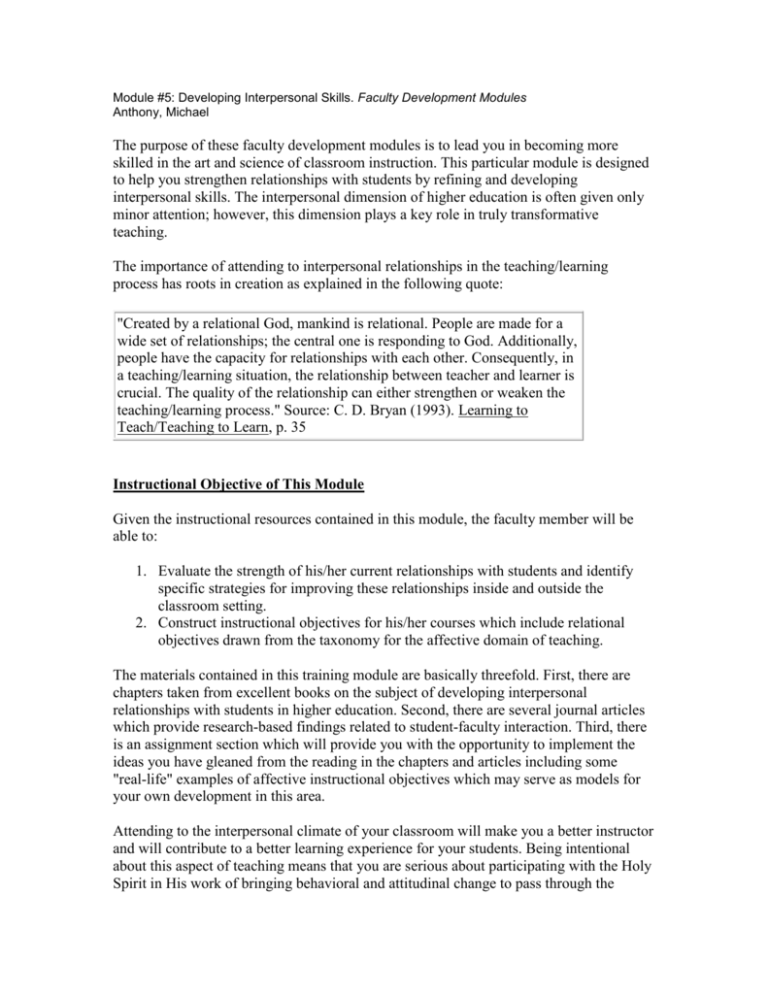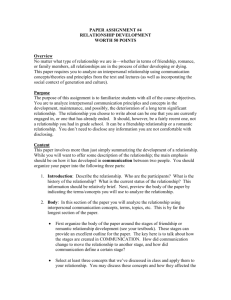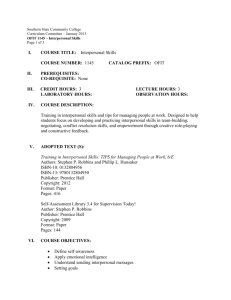Module #5: Developing Interpersonal Skills
advertisement

Module #5: Developing Interpersonal Skills. Faculty Development Modules Anthony, Michael The purpose of these faculty development modules is to lead you in becoming more skilled in the art and science of classroom instruction. This particular module is designed to help you strengthen relationships with students by refining and developing interpersonal skills. The interpersonal dimension of higher education is often given only minor attention; however, this dimension plays a key role in truly transformative teaching. The importance of attending to interpersonal relationships in the teaching/learning process has roots in creation as explained in the following quote: "Created by a relational God, mankind is relational. People are made for a wide set of relationships; the central one is responding to God. Additionally, people have the capacity for relationships with each other. Consequently, in a teaching/learning situation, the relationship between teacher and learner is crucial. The quality of the relationship can either strengthen or weaken the teaching/learning process." Source: C. D. Bryan (1993). Learning to Teach/Teaching to Learn, p. 35 Instructional Objective of This Module Given the instructional resources contained in this module, the faculty member will be able to: 1. Evaluate the strength of his/her current relationships with students and identify specific strategies for improving these relationships inside and outside the classroom setting. 2. Construct instructional objectives for his/her courses which include relational objectives drawn from the taxonomy for the affective domain of teaching. The materials contained in this training module are basically threefold. First, there are chapters taken from excellent books on the subject of developing interpersonal relationships with students in higher education. Second, there are several journal articles which provide research-based findings related to student-faculty interaction. Third, there is an assignment section which will provide you with the opportunity to implement the ideas you have gleaned from the reading in the chapters and articles including some "real-life" examples of affective instructional objectives which may serve as models for your own development in this area. Attending to the interpersonal climate of your classroom will make you a better instructor and will contribute to a better learning experience for your students. Being intentional about this aspect of teaching means that you are serious about participating with the Holy Spirit in His work of bringing behavioral and attitudinal change to pass through the powerful vehicle of genuine personal relationships. Chapter Readings 1) J. Lowman (1984). "Developing Interpersonal Skills and Teaching Style." Ch. 2 in Mastering the Techniques of Teaching. San Francisco, CA: Jossey-Bass Inc., Publishers. 2) S. D. Brookfield (1990). "Building Trust with Students." Ch. 12 in The Skillful Teacher. San Francisco, CA: Jossey-Bass Inc, Publishers. These two chapters do an excellent job of providing specific suggestions for developing and strengthening personal relationships with students. Joseph Lowman discusses strategies for forming personal relationships with students, how to solicit feedback from students, how to balance control with positive interpersonal relationships, and how to work with a variety of student personality types. Stephen Brookfield discusses the fine art of balancing teacher credibility with teacher authenticity in an overall effort to create a climate of trust between teacher and student in the classroom. Article Readings 1) R. C. DeLucia (1994). "Perceptions of Faculty-Student Relationships: A Survey." NASPA Journal, 31, pp. 271-279. 2) J. J. Endo & R. L. Harpel (1982). "The Effect of Student-Faculty Interaction on Students’ Educational Outcomes." Research in Higher Education, 16, pp. 115-136. 3) M. A. Lamport (1994). "Student-Faculty Informal Interaction and Its Relations to College Student Outcomes in Christian College Settings: Research and Implications." Research in Christian Higher Education, 1, pp. 66-78. The articles in this section provide results from three different studies which examined the impact of student-faculty relationships on various aspects of student development during the college years. Too often, "the educational concern for student-faculty interaction is somewhat nominal. Student-faculty relationships are regarded as ancillary, non-academic experiences" (Lamport, 1994, p. 66). For this reason, research in the field of academic interpersonal relationships is vital. A sampling of that research is provided for you here. Numerous specific suggestions are provided. View these articles as a smorgasbord of ideas from which you can select those best suited to you and your teaching situation. Your Assignment PART ONE: Developing Interpersonal Skills Within the Formal Curriculum One component of growing in classroom interpersonal skills involves being intentional about incorporating specific course objectives related to the affective domain into our syllabi and instructional methodology. To encourage this discipline, please complete the following: 1. Study the information on the following pages related to Benjamin Bloom’s taxonomy for the affective domain. 2. Examine the Sample Affective Educational Goals. 3. Develop two course learning goals, at each level of the affective taxonomy, for one of your courses. A sample has been provided for you. PART TWO: Developing Interpersonal Skills As Part of the Nonformal Curriculum On the pages following the taxonomy explanation and example, you will find a summary of the interpersonal relationship recommendations suggested in the chapters and articles you read in this module. To use these as an aid in building interpersonal relationships with students, please complete the following: 1. Select 5 of the suggestions which you would like to work on incorporating into your relationships with students. 2. For each selection, write 2-3 sentences describing a strategy you could employ to work toward achieving this goal. 3. Set a target completion date and name a specific person you will talk to you will hold you accountable in working toward your goals. More Resources Sample Affective Educational Goals These samples are written according to the affective domain of learning. Receiving 1. Learners will observe a play demonstrating Christ's love for mankind on video entitled "The Life and Crucifixion of Christ." 2. Recognizing that there may be more than one point of view, learners will listen to various types of Christian music including contemporary and classic, and discuss what is appropriate for church services today. Responding 1. Learners will share in groups a personal experience in which they either were shown or demonstrated God's love toward another. 2. Learners will express their interpretation of the passage in Matthew 19:19. Valuing 1. Using only the New Testament, each student will select a biblical character or a contemporary Christian they admire and write a one or two page report describing why. 2. Students will discuss in groups their opinion of the O.J. Simpson verdict. Organizing 1. Learners will develop and organize a personal schedule based on responsibilities in their personal life (school, homework, church activities, recreation, etc.). Learners will discuss their schedule and priorities within a small group. 2. To help develop dominant values, learners will arrange a list of situations given to them by the instructor and place them in order of personal preference. Example: In your opinion, a person who has worked all week will best spend Sunday engaged in what type of activity?: a. studying the Bible b. hearing a TV sermon c. attending a church service d. trying to catch up on graduate work Characterizing 1. Learners will interview a person of their choice from their community or church and complete a five to ten page essay on one of the following: "A good kind of person in our community is-" or "One of the greatest Christians in our church is-". 2. Having been presented with a checklist related to effective communication skills discussed during the semester, learners will set up a 30-minute appointment with the professor to discuss how they have come to practice, or not practice, some of these skills in their interpersonal relationships. Suggestions for Building Interpersonal Relations with Students 1. Learn students' names as quickly as possible 2. Arrive to class early, especially before the initial class meeting. This conditions students to expect to start on time and also provides opportunities to chat informally with them before class. 3. Announce office hours both verbally and by placing on a handout, or course outline. 4. In addition to being available during regular office hours, offer to schedule meetings at other times as well. 5. Scan the student newspaper for the names of any students that can be congratulated for various recognitions, activities, etc. 6. Make a special effort to attend athletic and artistic events in which your students are involved and show a genuine interest. 7. Encourage students to communication by seeking feedback--for example by handing out index cards and asking students to ask a question about you, course content, make a personal comment, or any matter they are concerned about. Stress that they are free to question or comment anonymously but that you will write a personal reply if they sign their names. Circulate more cards than students and point out they can send in two cards (signed and unsigned) if they wish. 8. Select carefully when attempting to control students, suggesting and implying rather than ordering or directing openly. When announcing course requirements, use dialect such as "I would like," "it is my hope," "You will probably want," instead of "I require," I expect," or "You must." 9. Give a rational justification for assignments by sharing objectives with the students. Allow choices whenever possible. 10. Require mastery of instructor-defined content at the beginning and more independent thinking and choice of topics at the end. In other words students should get a thorough understanding of course content first. 11. Treat students individually. 12. Individually meet with students at both formal and informal settings. 13. Invite students to visit or stop by the office. 14. Maintain tolerance for youthful behavior. One must genuinely like collage-age students and identify with their interests, both serious and foolish. 15. Encourage and respect your students. (Be sensitive to all ethnic groups) 16. LISTEN to your students. 17. Be friendly and greet them when you see them on the campus. CLASSROOM CLIMATE MEASUREMENTS Below is a short sample form to help you design a questionnaire of your own. You may want to make yours longer and more detailed. NAME: (OPTIONAL) -----------------------------Please answer yes, no, or comment to the following questions. 1. The instructor maintains eye contact with students during lectures. 2. The instructor presents clear directions. 3. The instructor is friendly both in the classroom and out. 4. The instructor appears friendly in class but really is hasty and short patient when approached on an individual basis. 5. The instructor allows the students to voice their opinion on lecture material associated with contemporary issues. 6. The instructor shows biased behavior towards certain groups. 7. The instructor listens to students attentively. 8. The instructor is helpful when students do not understand assignments and offers assistance and suggestions. 9. The instructor keeps his or her office hour appointments. 10. Please state any concerns you have concerning the communication climate in the class.




